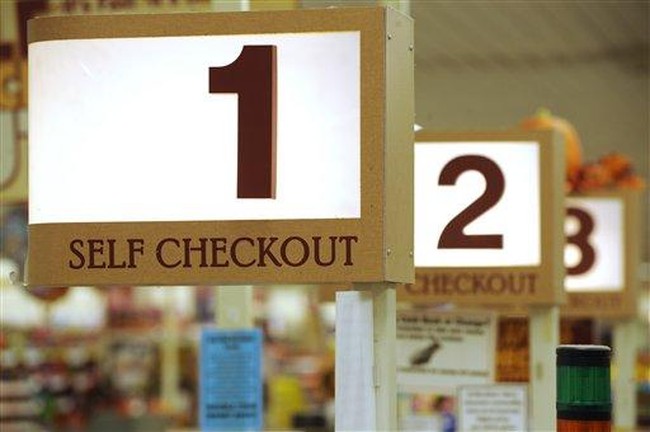
[ad_1]

Retail theft, among other crimes, is out of control in California, with the past couple of years seeing a massive spike in smash-and-grab robberies, shoplifting, and more. Now, California Democrats want to crack down on retail theft by proposing new legislation that would largely prevent grocery and some retail stores from using self-checkout lines. Instead of addressing some of the root causes of crimes like these, such as the passage of two controversial ballot initiatives — Propositions 47 and 57 in 2013 and 2016, respectively — California Democrats want to double down on their “nanny-state” policies and attack business, instead of the criminals that victimize them.
Senate Bill 1446, introduced by Democratic state Sen. Lola Smallwood-Cuevas, would “prohibit a grocery or retail drug establishment from providing a self-service checkout option for customers unless specified conditions are met,” according to the bill. Some of the conditions of the proposed legislation would allow self-checkout lines if there was an employee dedicated to observing no more than two self-checkout machines, and the employee cannot be required to do anything else while observing the machines. Smallwood-Cuevas defended her legislation, saying that self-checkout lines are a major driving factor in monetary loss for grocery and retail stores. According to Smallwood-Cuevas, $10 billion in losses can be attributed to these machines annually, and they cause 16 times more losses than regular checkout lines.
Smallwood-Cuevas is misleading you, however, by using the billions in losses number, she wants you to believe that self-checkouts are the main driver behind retail theft. The losses amount to approximately 3.5 percent of annual losses for retail stores, which is over 16 times more than regular cashiers. Indeed, that is a large number by any metric, however, some factors are being ignored here. For instance, when shoplifters come into the stores, either by themselves or in large groups, the goal of the suspect(s) is to obtain as much property as they can and immediately head for the exits to escape. They are either completely bypassing the checkout lines, whether they are self-checkout or not, or they simply walk by them without attempting to stop and even pretend as if they are using them. losses generated from a self-checkout machine are almost exclusively from people paying for some items and skipping others.
At self-checkout units, partial shrink is […] where a shopper pays for some of their purchase, but not the full amount. For example, a shopper might have three cans of soda but only scan two of them, or might type in a code for a lower-priced item.
In California, criminals have been emboldened by the onslaught of Democratic soft-on-crime laws, causing retail theft losses to steadily climb higher every year since at least 2016. Since propositions 47 and 57 were passed by the voters, incidents like these have become commonplace, and for good reason. When these laws required the reduction of non-violent felonies such as burglary and theft to misdemeanors, the light bulb on criminals’ heads went on. One law in particular that was gutted by Prop 47 was a section in the California penal code (666 P.C.) that made petty theft with prior convictions a felony. When I was working patrol as a deputy sheriff, this section was hugely effective in removing shoplifters and thieves from the streets. The responses from some suspects, both first-time and repeat offenders, were of pure shock when they found out about getting charged with a felony and possibly going to prison.
People are stealing from stores because they know that with policies such as no-cash bail, deferred prosecutions, and dropped charges for first-time offenders, there will be little to no consequences for stealing, and they can easily make money off the stolen items when they turn around and sell them for cash. There is no incentive for criminals to stop, rather it is the opposite; why wouldn’t they steal? Criminals also know that laws are being put into place that hamstring store employees from attempting to stop them from stealing, which makes an exit without even attempting to buy one item that much easier.
Now, with this new legislation being proposed, the Democrats will have simply removed a potential “roadblock” from the exit path of a would-be thief. Smallwood-Cuevas is using the reliable “Daddy government” to hamper what private businesses do in their stores rather than using common sense to reconsider and repeal some of the very laws she helped put in place that benefited the criminal. The soft-on-crime approach has to end, but Democrats like Smallwood-Cuevas refuse to listen and double down on their failed soft-on-crime policies.
[ad_2]
Source link